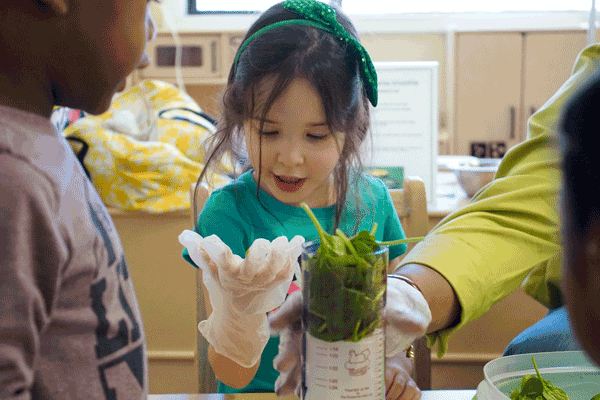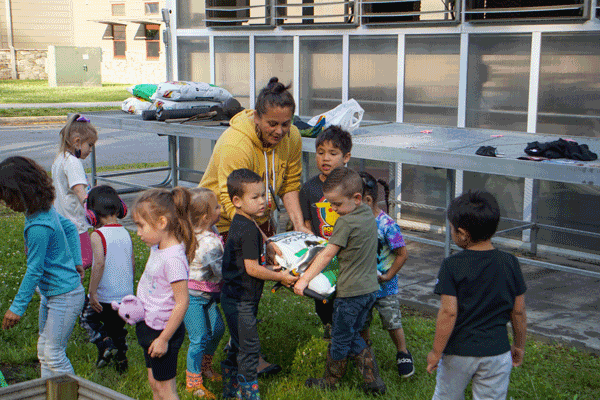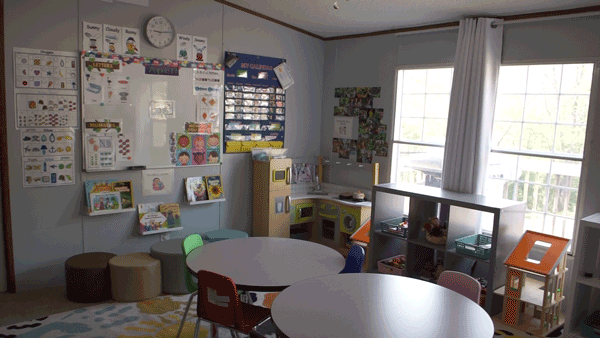Table of Contents
About this Guide
Introduction
What is Early Care and Education and Whom does It Serve?
Why is Early Care and Education Important?
Types of Child Care Programs in North Carolina
Center-based Child Care Centers
Farm to Early Care and Education
How Can Farm to ECE promote racial equity in our communities?
Connecting to Early Childhood Partners in Your Community
Defining North Carolina Farm to ECE Community Partnerships
North Carolina Partnership for Children (NC Smart Start)
Child Care Resource and Referral (CCRNR)
Head Start Community Action Agencies
Directly Connect to Centers Near You
A Note from Agent Quina Weber-Shirk, North Carolina Cooperative Extension in Guilford County
Joining the State and National Farm to ECE Movement
Three Components of Farm to ECE: Gardening, Cooking, and Local Food Purchasing
Component 1: Gardening
Benefits of Gardening with Young Children
Cooperative Extension + Gardening with Young Children
Special Considerations for Early Childhood Programs
North Carolina State Extension Master GardenerSM Program
Agent Spotlight: North Carolina Cooperative Extension in Caldwell County
Do Volunteers or Agents Need a Background Check to visit a Child Care Center?
Component 2: Cooking
Benefits of Cooking Local Food for and with Young Children
Cooperative Extension + Cooking for and with Young Children
Special considerations for Early Childhood Programs
Component 3: Local Food Purchasing
Benefits of Early Childhood Programs Purchasing Local Food
Cooperative Extension + Local Food Purchasing
Special Considerations for Purchasing Local with Early Childhood Programs
Cooperative Extension Agent Spotlight
Diverse, Inclusive, and Equitable Family Engagement Opportunities with Farm to ECE
Engaging Families in the School Garden
Cooking with Children and Cooking Education
References
About this Guide
North Carolina is home to an estimated 4,600 child care centers and over 1,800 child care homes (NC DHHS 2016). Early Care and Education (ECE) programs serve families with children from birth to age six. Early Care and Education serves a pivotal role for families because many children who attend child care eat most of their meals at school. Through Farm to ECE, North Carolina Cooperative Extension agents across program areas can provide important resources and programming for ECE providers and teachers, the families they serve, and local farmers. Local farmers can connect with programs that wish to serve healthier, local meals and snacks to children and can provide education about growing and eating healthy food.
This resource guide was created by the North Carolina Cooperative Extension Local Food Program Team’s Farm to ECE Work Group. This guide seeks to:
- explore how ECE programs serve families and show potential collaborations for Extension agents;
- inspire new local collaboration by highlighting successful Cooperative Extension Farm to ECE programs within communities that serve child care programs and their children, families, and teachers; and
- encourage cross-program activities to increase Farm to ECE support from Extension across North Carolina.
We hope this guide will enhance the partnerships among ECE and food system entities within communities, so that Extension can better serve farmers and families. These partnerships have the potential to improve nutritional outcomes for children and communities, and in turn, to increase food and nutrition security.
Introduction
What is Early Care and Education and Whom Does It Serve?
The National Association for the Education of Young Children (NAEYC) defines early childhood education as any part or full-day group program in a center, school, or home that serves children from birth through age six. This includes children with special developmental and learning needs (NAEYC 1993). The definition includes programs in child care centers (for-profit and non-profit), private and public pre-kindergarten programs such as North Carolina Pre-K, Head Start programs, family child care homes, kindergartens, primary grades, and before and after-school programs in elementary schools.
Why is Early Care and Education Important?
High-quality child care, Head Start, and preschool programs help prepare children for school and life success. Children in high quality programs tend to have:
- More advanced language and pre-math skills
- More advanced social skills
- Better relationships with their teachers
- Fewer behavioral challenges
- Easier adjustment to kindergarten
Children from low-income families and those at risk for academic challenges reap the biggest gains from high quality early care and education. These child populations, on average, start kindergarten behind their peers in literacy and language skills (NCECF 2021).
Through high-quality Early Care and Education programs, children also develop positive habits and daily routines, literacy and numeracy skills, and emotional resilience, which can lead to a successful future and a lifelong love of learning (Care for Kindies 2022).
Types of Child Care Programs in North Carolina
Head Start Programs
Head Start is a program of the US Department of Health and Human Services that provides comprehensive, early childhood education, as well as health, nutrition, and parent services to low-income children and families.
Head Start programs are federally funded and are available at no cost to children from birth to age five from low-income families. Programs may provide transportation to the centers so that enrolled children can participate. Families and children who are experiencing homelessness and children in the foster care system are also eligible. In addition, Head Start services are available to children with disabilities and other special needs.
Head Start programs encourage the school readiness of infants, toddlers, and preschool children (OHS 2020). Services are provided in a variety of settings that include centers, family child care, and the children’s own homes. Head Start programs also encourage parents and other key family members to develop positive relationships, with a focus on family wellbeing. Parents participate in leadership roles in the program, which may include providing feedback on program operations.
Family Child Care Homes
A family child care home (FCCH) is a child care arrangement located in a residence where at any time between three and eight children receive care. A family child care home is licensed by the Division of Child Development and Early Education (DCDEE).
Center-based Child Care Centers
A child care center is a program where three or more children younger than age 13 receive care on a regular basis, at least once a week, and for more than four hours from individuals unrelated to the children. Child care centers are usually located in commercial buildings. These centers are larger and care for more children than family child care providers. The centers are usually divided into groups or classrooms of children who are similar in age.
North Carolina Pre-K Program
The North Carolina Pre-K Program is designed to ensure that a high-quality pre-kindergarten classroom experience is provided for all eligible four-year-old children in each local North Carolina Pre-K Program and that, to the extent possible, uniform policies exist across the state. Programs are required to operate according to the North Carolina Child Care Rules.
References
Bloom, Dara. (n.d.). “Extension Master Food Volunteer Program.” Accessed March 28, 2022.
Boekelheide, Don and Lucy K. Bradley. (2019). Collard Greens and Common Ground: A North Carolina Community Food Gardening Handbook.
Bradley, Lucy. (2020a). “Learning Burst: Edible Landscaping (2020).” NC State Extension.
Bradley, Lucy. (2020b). “Learning Burst: Veggie Gardening 101 (2020).” NC State Extension.
Bradley, Lucy. (2022). “Gardening in Preschools.” NC State Extension.
Care for Kindies. (n.d.). “5 Ways Your Child Benefits from Early Childhood Education.” Accessed March 10, 2022.
Center for Environmental Farming Systems. (n.d.). “NC Farm to Early Care and Education.” Accessed March 19, 2022.
Center for Environmental Farming Systems. (2020). “Cooking Cart: Resources for Teachers and Providers.” Raleigh, North Carolina: Center for Environmental Farming Systems.
Center for Environmental Farming Systems. (2020). “Learning Burst: Aquaponics in ECE Classrooms: Resources for Teachers and Providers.” Raleigh, North Carolina: Center for Environmental Farming Systems.
Chaifetz, Ashley, Liz Driscoll, Chris Gunter, Diane Ducharme, and Ben Chapman. (2012). Food Safety for School and Community Gardens. N.C. Cooperative Extension.
Community Ground Works. (n.d.) “Making Your Own Local Baby Food.” Accessed March 28, 2022.
Cooking With Kids. (n.d). “Cooking with Kids.” Accessed March 28, 2022.
Davis, Kristi. (2020a). “Learning Burst: The Science of Canning - Part 1 (2020).” Raleigh, North Carolina: Center for Environmental Farming Systems.
Davis, Kristi. (2020b). “Learning Burst: The Science of Canning - Part 2 (2020).” Raleigh, North Carolina: Center for Environmental Farming Systems.
Driscoll, Liz. (2020a). “Learning Burst: Pollinator Class (2020).” Raleigh, North Carolina: Center for Environmental Farming Systems.
Driscoll, Liz. (2020b). “Learning Burst: Scrap Gardening and Botanical Science (2020).” Raleigh, North Carolina: Center for Environmental Farming Systems.
Estrada, Michelle. (2020a). “Learning burst: Cooking with children (2020).” Raleigh, North Carolina: Center for Environmental Farming Systems.
Estrada, Michelle. (2020b). “Learning Burst: Cultural Awareness when Cooking (2020).” Raleigh, North Carolina: Center for Environmental Farming Systems.
Estrada, Michelle. (2020c). “Learning burst: Incorporating cooking activities into the Curriculum (2020). Raleigh, North Carolina: Center for Environmental Farming Systems.
Farm to Early Care and Education. (2020). “Learning Burst: Local Food Purchasing 101 (2020).” Raleigh, North Carolina: Center for Environmental Farming Systems.
GO NAPSACC. (2018a). “Our Focus Areas.”
GO NAPSACC. (2018b). “Provider Tools.”
GO NAPSACC. (2018c). “Why GO NAPSACC?”
Growing Minds. (n.d.). “Cooking with Preschool Children.” Asheville, NC: Appalachian Sustainable Agriculture Project. Accessed March 29, 2022.
Growing Minds. (n.d.). “Farm to Preschool Toolkit.” Asheville, NC: Appalachian Sustainable Agriculture Project. Accessed March 29, 2022.
Growing Minds. (n.d.). “Local Food Cooking - Growing Minds.” Asheville, NC: Appalachian Sustainable Agriculture Project. Accessed March 25, 2022.
Growing Minds. (n.d.). “NC Farm To Preschool Network.” Asheville, NC: Appalachian Sustainable Agriculture Project. Accessed March 10, 2022.
Harvest for Healthy Kids. (2014). “Activity Kits.” Portland OR: Portland State university and Mt. Hood Community College Head Start.
Head Start Early Childhood Learning and Knowledge Center. (2022). “North Carolina Head Start Collaboration Office”
Hitt, Maria. (2020). “Learning Burst: Gardening, What to Plant and When?” Raleigh, North Carolina: Center for Environmental Farming Systems.
Huber, Brandon. (2020). “Learning Burst: Hydroponics in ECE Classrooms.” Raleigh, North Carolina: Center for Environmental Farming Systems.
Lelekacs, Joanna and Caroline Hundley. (2022). “Farm to Childcare.” NC State Extension.
McBurney, Jayne. (2022). “Steps to Health Color Me Healthy.” NC State Extension.
National Association for the Education of Young Children. (1993). A Conceptual Framework For Early Childhood Professional Development. Washington DC: National Association for the Education of Young Children.
National Farm to School Network. (2021). “About National Farm to School Network.” Chicago, IL: National Farm to School Network.
Natural Learning Initiative. (2022). “Resources.” Raleigh, North Carolina: The Natural Learning Initiative, College of Design, North Carolina State University.
Natural Learning Initiative. (2006). “Preschool Outdoor Play And Learning Environments - Best Practice Toolkit.” 2nd edition. Accessed March 10, 2022. Raleigh, North Carolina: The Natural Learning Initiative, College of Design, North Carolina State University.
NC DHHS. (n.d.) “NC Child Care Snapshot.” Accessed April 7, 2022. Raleigh, NC: NC DHHHS.
NC DHHS. (2021). “Seasonal CACFP Cycle Menus.” Raleigh, NC: Nutrition Services Branch, Division of Public Health, NC Department of Health and Human Services.
NC DHHS. (2021). “Serving Local Foods in North Carolina Child Care Centers: Guidance on Food Preparation and Gardening.” Raleigh, North Carolina: Center for Environmental Farming Systems.
NC Farm to Early Care and Education. (2020). “NC Fresh Produce Purchasing And Prep Guides – Tools For Childcare Providers.” Raleigh, North Carolina: Center for Environmental Farming Systems.
NC Farm to Early Care and Education. (2022). “Success Stories.” Raleigh, North Carolina: Center for Environmental Farming Systems.
NC Farm to Preschool Network. (2021). “Serving Local Foods in North Carolina Child Care Centers: Guidance On Food Preparation And Gardening.”
NC Poison Control. (2022). “Poisonous Plants.” Charlotte, NC: North Carolina Poison Control.
NC Cooperative Extension. (n.d.) “Color Me Healthy.” Accessed March 28, 2022.
NC State Extension. (n.d.) “Steps to Health.” Accessed March 28, 2022.
NC State Extension. (2020). “Grow Food from Seeds!”
NC State Extension. (2022). “Extension Master Gardener Volunteers”
North Carolina Early Childhood Foundation. (2021). “High Quality Early Care And Education.” Accessed March 10, 2022.
Office of Head Start. (2022). “Head Start Programs.” Accessed March 10, 2022.
Rutz, Jacob and Dara Bloom. (2019). “Farm to Early Care and Education Local Food Purchasing Guide.” NC State Extension.
Sherman, Rhonda. (2020a). “Learning Burst: Composting (2020).” Raleigh, North Carolina: Center for Environmental Farming Systems.
Sherman, Rhonda. (2020b). “Learning Burst: Vermicomposting (2020).” Raleigh, North Carolina: Center for Environmental Farming Systems.
Sledge, Bria. (2022). Gardening Activity Guide: A Resource to Promote Vegetable and Fruit Gardening with Young Children. Raleigh, North Carolina: The Natural Learning Initiative, College of Design, North Carolina State University.
Small Bites Adventure Club. (n.d.) a. “Go, Grow, Glow!” Accessed Match 28, 2022.
Small Bites Adventure Club. (n.d.) b. “Kids' Resources on Cooking, Gardening, Farming and Free At-Home Activities That Even Parents Can Learn From.” Accessed March 28, 2022.
Snyder, Eli. (2020a). “Learning Burst: Fall Gardening (2020).” Raleigh, North Carolina: Center for Environmental Farming Systems.
Snyder, Eli. (2020b). “Learning Burst: Gardening, Container Gardening (2020).” Raleigh, North Carolina: Center for Environmental Farming Systems.
Soldavini, Jessica. (2020). “Learning Burst: The Importance of Fruits And Veggies in Farm to ECE (2020)”. Raleigh, North Carolina: Center for Environmental Farming Systems.
Publication date: Jan. 19, 2023
LF-20
N.C. Cooperative Extension prohibits discrimination and harassment regardless of age, color, disability, family and marital status, gender identity, national origin, political beliefs, race, religion, sex (including pregnancy), sexual orientation and veteran status.



